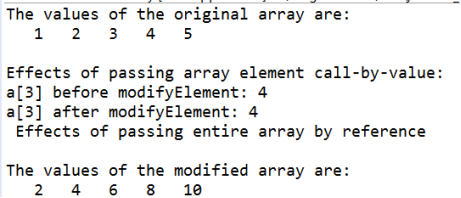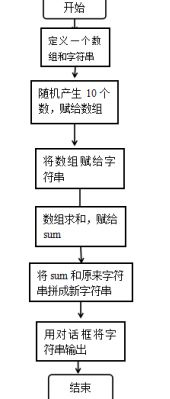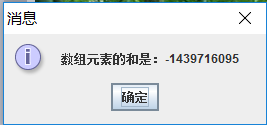1.阅读并运行示例PassArray.java,观察并分析程序输出的结果,小结,然后与下页幻灯片所讲的内容进行对照。
源代码:
public class PassArray {
public static void main(String[] args) {
int a[] = { 1, 2, 3, 4, 5 };
String output = "The values of the original array are: ";
for (int i = 0; i < a.length; i++)
output += " " + a[i];
output += " Effects of passing array " + "element call-by-value: "+ "a[3] before modifyElement: " + a[3];
modifyElement(a[3]);
output += " a[3] after modifyElement: " + a[3];
output += " Effects of passing entire array by reference";
modifyArray(a); // array a passed call-by-reference
output += " The values of the modified array are: ";
for (int i = 0; i < a.length; i++)
output += " " + a[i];
System.out.println(output);
}
public static void modifyArray(int b[]) {
for (int j = 0; j < b.length; j++)
b[j] *= 2;
}
public static void modifyElement(int e) {
e *= 2;
}
运行结果

分析
对于数组的传递使用的是引用传递,改变的是原数据的的储存值;而对于数值的传递是按值传递,改变的只是原始数据的一个拷贝
按引用传递与按值传送数组类型方法参数的最大关键在于:
使用前者时,如果方法中有代码更改了数组元素的值,实际上是直接修改了原始的数组元素。
使用后者则没有这个问题,方法体中修改的仅是原始数组元素的一个拷贝。
2.以下代码的输出结果是什么?为什么会有这个结果?
int[] a = {5, 7 , 20};
int[] b = new int[4];
System.out.println("b数组的长度为:" + b.length);
b = a;
System.out.println("b数组的长度为:" + b.length);
输出结果
b数组的长度为:4
b数组的长度为:3
原因
代码 b = a;表示的是将数组a的地址赋值给b,所以数组b就相当于是数组a,数组a有3个元素,所以数组b的长度为3;
3.请编写一个程序将一个整数转换为汉字读法字符串。比如“1123”转换为“一千一百二十三”。
源代码
import java.util.Scanner;
public class zhuanhuan {
static String wei []={"","十","百","千","万"};
static String han []={"零","一","二","三","四","五","六","七","八","九"};
static String output="";
public static void main(String[] args){
System.out.println("输入一个数");
Scanner sc=new Scanner(System.in);
int n=sc.nextInt();
int c=weishu(n);
shu(n,c);
}
public static int weishu(int x){ //判断数的位数
int a=10,n=1;
double b=x/a;
if(b<1)
return n;
else
{n=2;
while(b>1)
{
a=a*10;
n++;
b=x/a;
}
return n;
}
}
public static void shu(int x,int y){ //将数的各个位分离存到数组中
int a=1;
int j=0;
int c[]=new int[y];
for(int i=1;i<y;i++)
{
a=a*10;
}
while(a>0)
{
int b=x/a;
c[j]=b;
j++;
x=x%a;
a=a/10;
}
int n=0;
for(int i=0;i<y;i++) //将数字转换成汉字
{
int k=c[i];
if(k==0)
{
n++;
if(n>1)
{
n--;
continue;
}
output+=han[k];
continue;
}
output+=han[k]+wei[y - i -1];
}
System.out.println(output);
}
}
结果截图

4.随机生成10个数,填充一个数组,然后用消息框显示数组内容,接着计算数组元素的和,将结果也显示在消息框中。
要求将设计思路、程序流程图、源程序代码、结果截图、编程总结等
设计思路:
1.首先定义一个长度为实的数组;
2.循环十次产生十个随机数并存到数组中;
3.定义一个String类型变量;
4.将数组中的元素都连到String类型的变量中;
5.最后用消息框输出;
源代码
public class RandomInt {
public static void main(String[] args){
int sum=0;
String output="";
int a []=new int[10];
Random r=new Random();
for(int i=0;i<10;i++)
{
a[i]=(int) r.nextInt();
output+=a[i]+" ";
}
for(int i=0;i<10;i++)
sum+=a[i];
JOptionPane.showMessageDialog(null, "数组元素为:"+output);
JOptionPane.showMessageDialog(null, "数组元素的和是:"+sum);
}
}
流程图

截图

